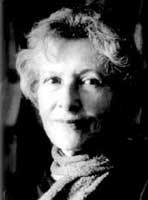|
|
 |
 |

Denise Levertov
丹妮丝-列维尔托夫
  Denise Levertov was born in Ilford, Essex, England in 1923. Her first book The Double Image, published in 1946, brought her recognition as one of a group poets dubbed the "New Romantics." In 1947 Levertov married Mitchell Goodman, an American writer, and a year later they moved to America. They settled in New York City. After she published Here and Now (1956), With Eyes at the Back of our Heads (1959) and The Sorrow Dance (1967), she went on to publish more than twenty volumes of poetry, including Freeing the Dust (1975), which won the Lenore Marshall Poetry Prize. She was also the author of four books of prose, most recently Tesserae (1995), and translator of three volumes of poetry, among them Jean Joubert's Black Iris (1989). From 1982 to 1993, she taught at Stanford University. She spent the last decade of her life in Seattle, Washington, during which time she published Poems 1968-1972 (1987), Breathing the Water (1987), A Door in the Hive (1989), Evening Train (1992), and The Sands of the Well (1996). Denise Levertov died in December 1997. Denise Levertov was born in Ilford, Essex, England in 1923. Her first book The Double Image, published in 1946, brought her recognition as one of a group poets dubbed the "New Romantics." In 1947 Levertov married Mitchell Goodman, an American writer, and a year later they moved to America. They settled in New York City. After she published Here and Now (1956), With Eyes at the Back of our Heads (1959) and The Sorrow Dance (1967), she went on to publish more than twenty volumes of poetry, including Freeing the Dust (1975), which won the Lenore Marshall Poetry Prize. She was also the author of four books of prose, most recently Tesserae (1995), and translator of three volumes of poetry, among them Jean Joubert's Black Iris (1989). From 1982 to 1993, she taught at Stanford University. She spent the last decade of her life in Seattle, Washington, during which time she published Poems 1968-1972 (1987), Breathing the Water (1987), A Door in the Hive (1989), Evening Train (1992), and The Sands of the Well (1996). Denise Levertov died in December 1997.
丹妮丝-列维尔托夫1923年出生于英格兰埃塞克斯郡的伊尔佛德市。她的第一本书《重影》于1946年出版,让她得以公认为“新浪漫派”诗人之一。1947年, 尼乌托夫与美国作家米切尔-古德曼结婚,一年后移民美国。他们定居纽约市。继《此时此地》(1956)、《我们脑后长眼》(1959)、《悲舞》(1967 )之后,她接着出版了二十多本诗集,其中包括获得马歇尔诗歌奖的《释尘》(1975)。她还是四本散文集的作者,最新出版的是《罗马古玩》(1995);她翻译了三本诗集,其中有法国作家琼-儒贝耳的《黑眼膜》(1989)。从1982年到1993年,她在斯坦福大学任教。她生命的最后十年是在华盛顿州的西雅图市度过的,在这期间她出版了《诗集 1968-1972》(1987),《呼吸水》(1987),《蜂巢里的门》(1989),《傍晚火车》(1992),《井沙》(1996)。丹妮丝-列维尔托夫于1997年12月去世。
|

|

译者
Translator
Laoha
老哈
Laoha, poet and translator, pen name of Xiaoqing Mario Li, born in China in 1960. He moved to USA in 1986 and made his residence in northern Nevada since 1987.
 
老哈,诗人、译者,原名李小庆,1960年出生于中国成都,1986年赴美,后定居内华达至今。
|
 |
Losing Track |
 |
浑然不知 |
Long after you have swung back
away from me
I think you are still with me:
you come in close to the shore
on the tide
and nudge me awake the way
a boat adrift nudges the pier:
am I a pier
half-in half-out of the water?
and in the pleasure of that communion
I lose track,
the moon I watch goes down, the
tide swings you away before
I know I'm
alone again long since,
mud sucking at gray and black
timbers of me,
a light growth of green dreams drying.
|
|
你从我的身边漂去,
已经很久,
我以为你还是跟我一起:
你乘着潮水而来,
靠近岸边,
好似随波逐流的船
轻靠码头,将我推醒:
难道我是
一个半沉半浮码头吗?
在那愉快的交流中,我
浑然不知,
我看着月亮沉下去,
在我得知自己会再度
长久孤独,
潮水早已带你漂去,
淤泥吸着我灰黑的枝干,
一个绿梦,
这柔弱的生命正在干枯。
|
 |
The Mutes |
 |
无言 |
Those groans men use
passing a woman on the street
or on the steps of the subway
to tell her she is a female
and their flesh knows it,
are they a sort of tune,
an ugly enough song, sung
by a bird with a slit tongue
but meant for music?
Or are they the muffled roaring
of deafmutes trapped in a building that is
slowly filling with smoke?
Perhaps both.
Such men most often
look as if groan were all they could do,
yet a woman, in spite of herself,
knows it's a tribute:
if she were lacking all grace
they'd pass her in silence:
so it's not only to say she's
a warm hole. It's a word
in grief-language, nothing to do with
primitive, not an ur-language;
language stricken, sickened, cast down
in decrepitude. She wants to
throw the tribute away, dis-
gusted, and can't,
it goes on buzzing in her ear,
it changes the pace of her walk,
the torn posters in echoing corridors
spell it out, it
quakes and gnashes as the train comes in.
Her pulse sullenly
had picked up speed,
but the cars slow down and
jar to a stop while her understanding
keeps on translating:
'Life after life after life goes by
without poetry,
without seemliness,
without love.'
|
|
“唔. . . . ”走过这女人的身边,
或是在街面,或是在地铁站台,
那些男人们轻声叹息。
意思是说,她是一个女性,
对此,他们的肉体一清二楚。
难道这声调,
这丑得不能再丑的歌,
由一只豁嘴的鸟唱出来
其实原本是音乐?
或许这是受压抑的咆哮,
一座烟雾缓缓弥漫的楼房里,
受困的聋哑人口中发出?
或许二者皆是。
表面看来,这些男人
他们的力所能及常常只有叹息;
而女人,不知不觉中,
却清楚这是好意:
如果她风姿欠佳,
他们走过就会默默无语:
所以,这不仅仅是在说
她是一个暖孔。这个词
与远古的原始毫不相关,
是伤心话,不是粗话;
是侵袭过的,病态的,
老朽沮丧的语言。
这好意,她深恶痛绝,
欲罢不能,却一直
在她耳中叽叽喳喳,
随著她的步伐变化;
墙上破碎的画报,
在回声震荡的通道里,
拼写它的名字;火车来时,
它颤抖、咬牙切齿。
她的脉搏在郁闷中加快,
可车流却变得迟缓,
塞在停车牌前。此时
理智的她在不停地读解:
“时光流淌、时光流淌、时光流淌,
没有诗,
没有缘分,
没有爱情。”
|
 |
The Secret |
 |
秘密 |
Two girls discover
the secret of life
in a sudden line of
poetry.
I who don't know the
secret wrote
the line. They
told me
(through a third person)
they had found it
but not what it was
not even
what line it was. No doubt
by now, more than a week
later, they have forgotten
the secret,
the line, the name of
the poem. I love them
for finding what
I can't find,
and for loving me
for the line I wrote,
and for forgetting it
so that
a thousand times, till death
finds them, they may
discover it again, in other
lines
in other
happenings. And for
wanting to know it,
for
assuming there is
such a secret, yes,
for that
most of all.
|
|
出乎意料,
在一段诗行里,
两个女孩子发现了
生活的秘密。
那秘密,
写那诗行的我
却毫不知情。她们
辗转告诉我,
她们发现了
那秘密,但不知道
那秘密是什么,
在哪一段诗行。
无疑,她们已经,
在一个星期后的今天,
忘记了那秘密,
那诗行,
那首诗的标题。
我爱她们,
爱她们找到
我找不到的东西,
爱她们喜爱
我写的诗,
爱她们
已把那秘密忘记。
这样,在死亡
来临前,她们会
成千上万次,在其他
事件的字里行间,
一遍又一遍
再次发现那秘密。
我爱她们
想要知道那秘密,
最为首要的是,
让她们
认定
有那么一个秘密。
|
 |
|
|







